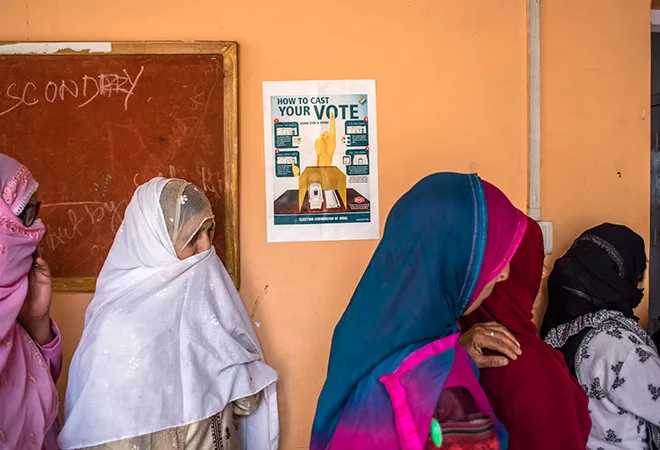As India goes through its electoral cycle, it is worth remembering that in the wider Asian region, an electoral churn is taking place. From Indonesia to the Philippines, from Afghanistan to Thailand, and from Australia to Sri Lanka, this is the year of the voter in the region. Even North Korea held its sham election of deputies to the 14th Supreme People’s Assembly (SPA) in March, which for the first time saw a North Korean leader not participating as a candidate. There will be change in some countries while some others will see continuity in the domestic political make-up as a result. But what makes these elections interesting to watch is how the changing global balance of power is shaping the electoral discourse in many of the nations. China is now an important variable in how the domestic political milieu is being redrawn in many countries, exemplifying not only the growing heft of China in global politics, but also a sense of unease about the role China has begun to play in the world, in the region, and even in some cases within certain states.
Elections in Indonesia saw economic nationalism moving to the centre stage of electoral politics. President Joko Widodo, or Jokowi, who is seeking a second term, has been very solicitous of Chinese investments in Indonesia, including a multi-billion high-speed railway between Jakarta and the city of Bandung in Java and infrastructure projects like power plants.
His rival Prabowo Subianto, a retired army general, on the other hand, has been very critical of the way China goes about its economic business, leading to excessive foreign interest, debt and a lack of involvement of locals in major projects. Reminiscent of Malaysia’s Mahathir Mohamad, Prabowo has claimed that he would reduce Indonesia’s dependence on China, though how exactly he would do so remains far from clear. Where Jokowi has embraced China’s Belt and Road Initiative (BRI) warmly, Prabowo has suggested that existing projects be reviewed to see if Indonesia can get a “better deal".
While ties with China might continue unperturbed after the elections, what is clear is that China’s growing role in Indonesia has sparked a debate which is unlikely to subside even after the new president takes over.
This is something that Australia has been engaged with for quite some time now, but the last few years have seen the China factor emerging with even greater potency. Australia has for decades managed to navigate its foreign policy between China, its largest trading partner, and the US, its main strategic alliance partner. It was all going well till China became a truly regional power and started asserting itself more forcefully. As China’s role in Australian domestic politics started becoming more prominent, Canberra was forced to reassess its ties.
A prominent Australian senator, Sam Dastyari, had to resign in 2017 over accusations of lobbying for Beijing and taking money from Chinese-born political donors. This led Canberra to pass a foreign interference law, requiring lobbyists for other countries to register and disclose their activities; the country then banned Huawei, the Chinese technology giant, from participating in the building of a fifth-generation telecommunications network.
The China challenge is now out in the open and both the main political parties of Australia have to contend with it. As the wider Indo-Pacific region remakes itself at a time of unprecedented strategic flux, whoever comes to power will be faced with the most significant foreign policy challenge Australia has faced in generations.
South Asian neighbours of India—Afghanistan and Sri Lanka—will also be voting later this year. China’s subtle presence in the Afghanistan debate via its proxy Pakistan will shape not only the ongoing dialogue with the Taliban, but also the long-term viability of a stable Afghanistan. China is not only the largest investor in Afghanistan but is seeking to expand its economic footprint in the country with its companies involved in construction projects. China’s interest in Afghanistan’s mineral wealth is well known, but it also doesn’t want the US to withdraw abruptly. It remains worried that a destabilized Afghanistan would jeopardize its ambitious China-Pakistan Economic Corridor.
In Sri Lanka, China will have an overt presence. In the previous presidential election, Maithripala Sirisena was the one challenging China’s growing footprint in Sri Lanka while Mahinda Rajapaksa was defending his close ties with Beijing. Once he came to office, Sirisena recognized that the challenge of managing China’s growing economic footprint is not that simple. Hambantota had to be handed over to China on a 99-year lease, after all.
In Indian elections, China has only played a subtler role. While the focus of the electoral rhetoric has been on Pakistan, serious policymakers of both the main political parties recognize that the real challenge is China. China’s role in shielding Pakistan in global forums and scuttling India’s chances of a seat at the global high table is now much more visible. India’s Pakistan problem is a subset of India’s China problem now.
China’s dramatic rise is reshaping the global balance of power. But even before states have had enough time to adjust to this structural reality, they are realizing that even domestic politics is not immune from the impact of the rise of China. In that sense, domestic is the new global.
This commentary originally appeared in Live Mint.
The views expressed above belong to the author(s). ORF research and analyses now available on Telegram! Click here to access our curated content — blogs, longforms and interviews.




 PREV
PREV


